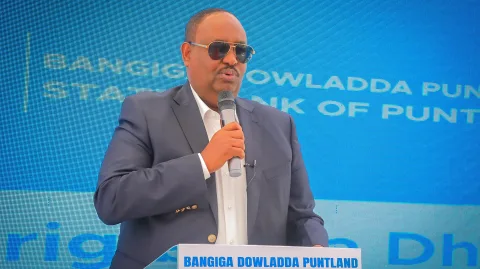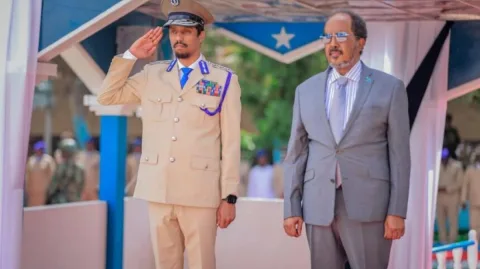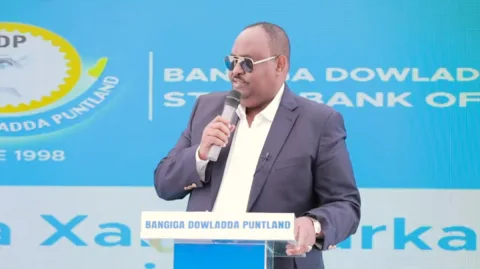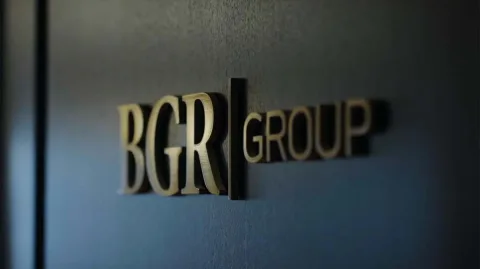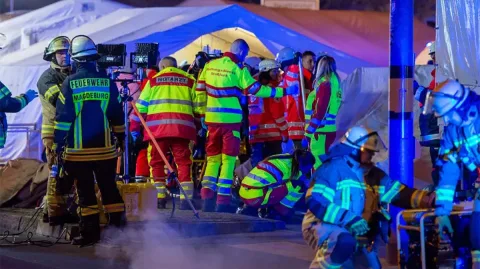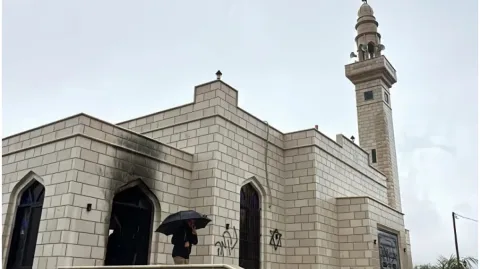By: Abdurahman W. Jama To reinvigorate the beleaguered trade in Puntland (PL), President Gaas needs to…

By: Abdurahman W. Jama
To reinvigorate the beleaguered trade in Puntland (PL), President Gaas needs to remove the obstacles that have contributed to economic slowdown in the past four years. High taxes, a closed border between Ethiopia and PL, and copious checkpoints on the main road have been the main factors of the economic setback. And the last election in PL, as a matter of fact, was based on a search for leadership that could improve the debilitated economy, rather than just a change in leadership itself. As an economics professor with loaded credentials and a profound knowledge of fiscal policy, people trust Gaas as someone who can address their economic concerns. To positively answer the demands and aspirations of the people, the president should immediately reduce taxes, open customs and remove all unnecessary checkpoints on the highway between Bosaso and Glakacyo.
The people of PL insisted on a change of government in last year’s presidential election, and members of parliament affirmed the will of the people’ at the ballot box on January 8th, 2014. The overwhelming majority of the people called for removal of the regime that had instigated and overseen five years of downward spiral economic regression. The hopes and expectations of the people had been validated with the election of the new president, in whose capability as a leader people have conferred a high hope would bring back the good days of economic progress. In addition, people have confidence that the newly elected leader, and the executive cabinet he has designated, will remove the impediments and hindrances that previously prompted the deterioration of the economy. Electing Professor Gas as the president of PL has created an unprecedented level of hope and aspiration – for the majority of Puntlanders in particular, and all Somalis in general.
High Taxes
To bring back the good days of economic and trade boom, the current administration should immediately address the impractical taxes charged on the imported goods at the Bosaso Port. The prior government had astronomically raised taxes on both imported and exported items without due consideration on the negative impact the taxes would have on the economy and growth in general. Consistently, tariffs on the merchandise at Bosaso port were realistic and rational before the Farole administration. Leaders before him had prudently recognized the state of the Port and devised a method where it could competently vie with other ports. As a result, traders from other parts of the country preferred Bosaso port as their port of entry for imported goods, as well as livestock bound for Middle East countries. The policy of low taxes on goods, welcoming buyers, and allotted incentives to lure traders outside PL was marred by higher taxes and stricter security measures by the preceding regime.
Though Bosaso port is only a partially built port, and wouldn’t handle larger vessels to provide the same services as other ports in the country would, it had successfully competed with other ports in the country. Sound policies of previous administrations in relation to economic growth have brought prosperity and economic boom in Punt Land for over 17 years. Unfortunately, however, those rational economic polices (lower tariffs and favorable business settings) that had steered economic growth and continuous development in Punt Land were not sustained. For instance, during the five years of the Farole administration, tariffs on some imported and exported commodities were excessively raised – by 125%.
Statistics show that Bosaso Port has lost over 35% of its customers, who had been coming from all over Somalia and East Ethiopia (Ismaamulka Somalida Ethiopia). Large numbers of traders and companies, who had been using Bosaso port as a gateway for their merchandise, had moved to other ports such as Berbera and Mogadishu. Consequently, people who also use to buy their merchandises from Bosaso market had stopped shopping at Bosaso, since the goods became more expensive than the other marketplaces, due to higher taxes and other security restrictions.
Extreme taxes on imported goods at the port are one of the main factors that contributed the economic slowdown in PL. Therefore, reversing trade-damaging taxes should be priority number one for this administration, to correct the failed and unproductive economic strategies of the past.
The Customs:
PL has a long border with East Ethiopia; a land-locked country that depends on its neighboring countries for any of its imported goods outside of the region. Traditionally, PL companies have had strong ties with traders from East Ethiopia. Over 20% of imported items at the Bosaso port usually were re-exported to East Ethiopia. Regrettably, however, since 2010 business relationships between Ethiopia and PL have completely vanished after Ethiopia became closed to any trade coming from Somalia, without first having gone through appropriate customs at the border.
The Ethiopian government enthusiastically invited PL administration to establish customs at the border to process legitimate trade to Ethiopia and eliminate illegal business practices between the countries. Unfortunately, however, the previous administration failed to capitalize on the opportunity to rescue the weakened economy. It was one of the biggest mistakes for the previous government and still baffles the minds of the business community as to why the Farole administration did not seize the opportunity to salvage the incapacitated economy. As a matter of fact, establishing cross-border customs between the two countries would have been a victory for PL, as it has been for Somaliland.
Opening customs at the border between Ethiopia and PL would increase business opportunities for traders from both sides; it would increase growth and expand revenue for both countries. Ethiopia has been ready to mutually establish customs for a long a time, but has been waiting for a PL response. Border customs is a paramount subject for reviving the extinct trade with East Ethiopia. It had been the hope of the business community that President Gaas’s agenda with Ethiopian officials in his visit last month, specifically with the Somali regional state of Ethiopia, would include the customs issue as a top priority.
Opening customs between Ethiopia and PL would increase business opportunities for traders in the business community, increase growth, and expand revenue for both countries. In addition, customs would foster harmony for the people of both countries.
Checkpoints:
Frequent checkpoints on the main road in PL are another impediment to the competitiveness of goods imported through Bosaso port. There are about 15 roadblocks on the highway between Bosaso and Galkacyo. At each checkpoint, trucks carrying merchandise are required to pay $10-40 at each checkpoint. For instance, the average charge on a vehicle carrying 400 bags of flour, from Bosaso to Galkacyo, is estimated to be $375. Eventually, this unnecessary charge on the transportation of essential items will increase the cost of commodities and will most certainly deprive PL traders of the chance to compete with other businesses.
Checkpoints (the Local Economy Development Fund, as the previous government put it) are stimulating the local economy of the villages along the corridor of the main road. This characterization is a misnomer; rather these checkpoints have increased and promoted consumption of Qaat or Jaat in the villages along the road. Anyone who has traveled on that road, either by day or night, would notice the incessant use of Qaat at the checkpoints by the sentries. It is evident that the existence of these checkpoints is an obstacle to trade and should not be allowed to continue as they are now. They must be dismantled, except those which are deemed to have security importance.
In conclusion, the aforementioned factors are not a panacea for all issues concerning trade and economy slowdown in PL. There are many other problems which come into play, when it comes to fiscal and social problems in Puntland and the rest of the country as well. There are other matters which require a comprehensive enquiry and examination in order to get a complete picture of the underlying aspects. However, reexamining the tax system, sanctioning a customs at the border with East Ethiopia, and removing ubiquitous checkpoints along the main highway would support an immediate trade increase and job creation for the people.
The challenge now remains for President Gaas to translate the unmatched hope of the people into action.
By: Abdurahman W. Jama
Founder and former Executive Director, East African Community Services,
Seattle, Washington State
Currently,CEO, Opec General Trading Company, Bosaso, Somalia.
Email: awjama@gmail.com.
How to Submit an Op-Ed Article?
Horseed Media accepts opinion articles about a subject, the Op-Ed section. All entries must be original and exclusive to Horseed Media. We do not consider that the articles already published on another website, so you do not submit an article that you have already sent elsewhere. Please do not send your articles in PDF format. More info Click here
